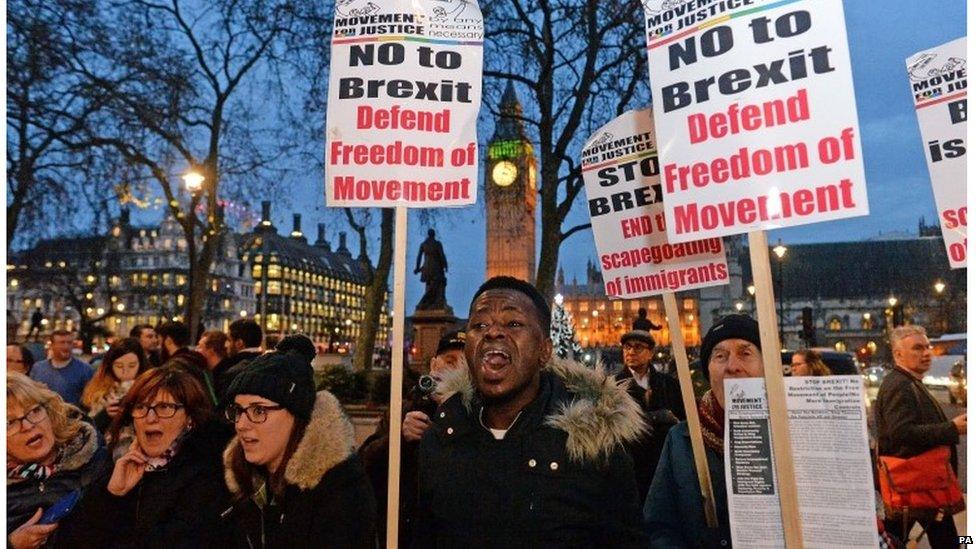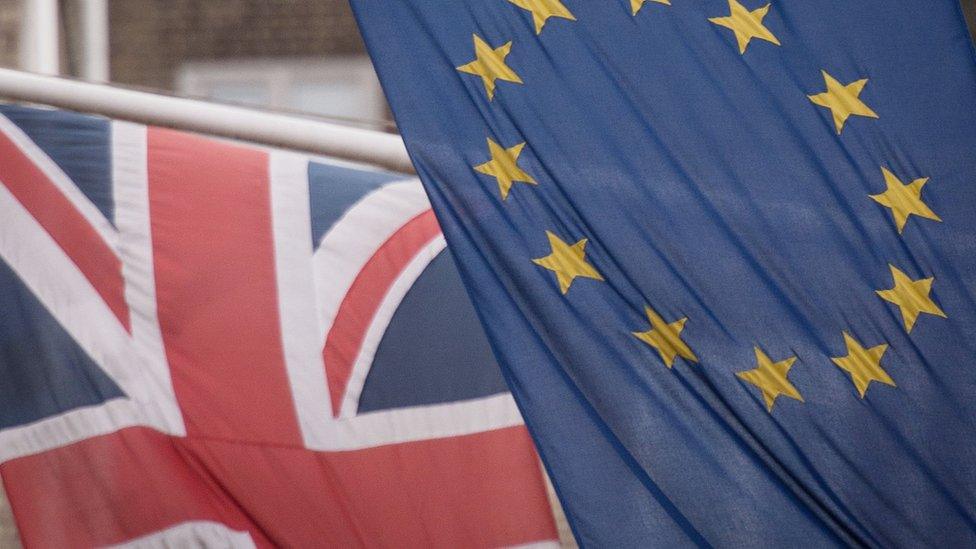Call for 'unilateral' Brexit guarantee for EU citizens
- Published
- comments

The fate of EU nationals in the UK is wrapped up with wider questions over free movement
The UK has a "moral" duty to guarantee the status of EU nationals living in the country ahead of negotiations over its exit, a group of peers has said.
A Lords EU committee has called for an immediate "unilateral undertaking" that EU nationals can continue to live, work and study in the UK after Brexit.
It said failure to do this would have a severe impact on migrants' rights.
Ministers say they expect this to happen but need equivalent guarantees for UK citizens on the Continent.
The question of what will happen to the estimated 2.9 million citizens of other EU countries who have made their home in the UK in recent years is one of the most controversial arising from the UK's vote to leave the EU in June's referendum.
The government has said it expects an early resolution of the issue once official talks on the terms of the UK's separation from the EU begin next spring.
But it has refrained from giving any guarantees on their future status - saying this is impossible without similar safeguards for the estimated 1.2 million Britons living in Spain, France, Italy and other EU countries.
But the Lords EU Justice sub-committee said the UK should not wait to hear from other EU countries and that making a binding commitment now was "morally the right thing to do".
'Shrouded in anxiety'
If this was not possible before Article 50 is triggered, expected before the end of March, the peers said the issue should be negotiated separately from other matters to ensure a "preliminary" agreement as quickly as possible.
Without any agreement, it said EU nationals living in the UK would be subject to "Byzantine" national immigration laws and many would be unable to meet the criteria for permanent residency despite having been here for more than five years.
"The government is under a moral obligation to give a unilateral declaration immediately to safeguard the EU citizenship rights of all EU nationals in the UK when the UK withdraws from the EU," said Baroness Kennedy QC, the Labour peer who chairs the cross-party committee.
"I also believe that such a gesture will stimulate reciprocal commitments from the other EU countries where UK citizens are currently living.
"For the last six months, the lives of EU citizens living in the UK and UK citizens living in the EU have been shrouded in anxiety.
"Their rights to live, work and reside in their country of choice are now so unclear that people have no idea how, or even where, they should plan their futures."
The government has said it wants to limit the currently unconditional right of EU citizens to come to the UK as part of the Brexit settlement.
In their report, the peers said the principle of "acquired rights" was narrow and hard to enforce in international law and that the full scope of rights would have to be guaranteed in the Brexit agreement for it to withstand legal challenge.
'Best possible deal'
Officials have indicated there would have to be some cut-off point after which full rights could not be guaranteed but have not said when this would be.
A government spokesman said: "We're determined to get the best possible deal for the UK and are preparing for a smooth and orderly exit from the EU.
"The prime minister has been clear that she wants to protect the status of EU nationals already living here, and the only circumstances in which that wouldn't be possible is if British citizens' rights in European member states were not protected in return."
In a separate development, Whitehall has been warned that it needs to be better resourced to cope with EU negotiations and make a success of them.
The Institute for Government said Downing Street's "desire for secrecy" was hindering preparations for Brexit and more was needed "in terms of money, staff and information".
Brexit Secretary David Davis is likely to be questioned on both issues when he appears before the Commons Select Committee on exiting the EU for the first time later.
- Published13 December 2016

- Published12 December 2016
